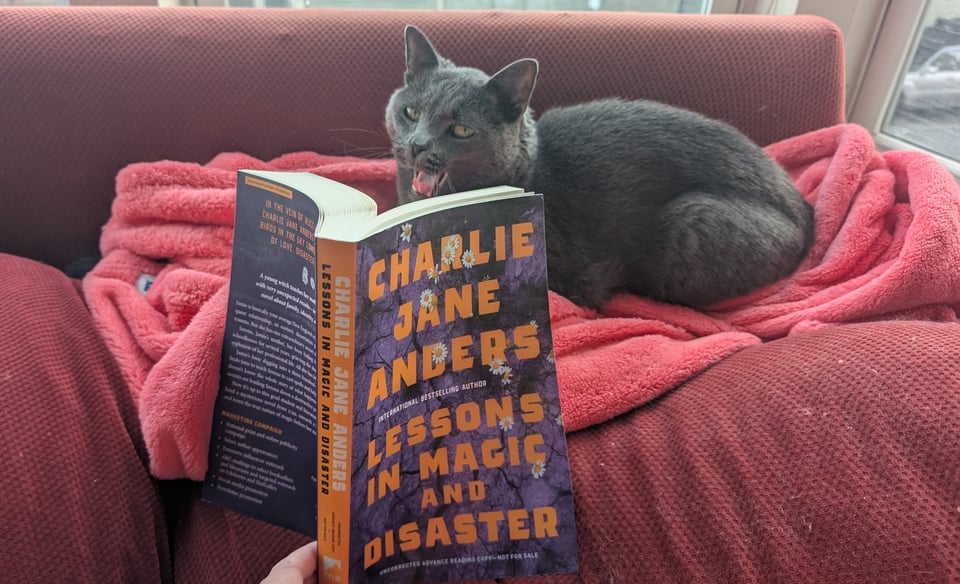You're Not as Smart as You Think You Are
First, some housekeeping!
I have written a novel about a trans witch who teaches her broken-hearted mother how to do magic. She also researches a mysterious novel from 1749 and deals with academic politics. It’s called Lessons in Magic and Disaster, and you can get it everywhere — but if you want a signed and personalized copy with a terrible cat doodle, you can order from Green Apple Books.
Creating Space Journal recently wrote a lovely mini-review:
What if magic isn’t the stuff of Harry Potter pomp and happy circumstance, but instead an on-going attempt to control entropy and emotion? Anders writes about gender and sexual identities, magic, self-regulation and relationships with equal aplomb and flair; at times you feel like she’s transcribing your sitting-in-the-car-scrolling thoughts with uncanny precision.

Also, if you pre-ordered Lessons and submitted a receipt, you should have received your pre-order reward: a 275-page PDF containing a tonne of deleted and alternate stuff from my novel All the Birds in the Sky, plus a sneak peek at the sequel in progress, All the Seeds in the Ground. If you didn’t get that PDF, please email me at limadcopies@gmail <3
Okay, with that out of the way…
IQ Ain’t Nothin But a Number
My father was allegedly one of the smartest people in the world.
At one point, there was a book called The Book of Lists that named my father as having had the highest recorded IQ in history. They printed an edition of The Book of Lists on rolls of toilet paper, so you could always have something to read on the toilet. (This was a short-lived fad. At some point I guess the notion of putting ink on toilet paper began to seem less attractive, for obvious reasons.) Our neighbors, two doors down, actually owned The Book of Lists in toilet paper form, and we used to joke that we could go over there and wipe our asses with my dad's high IQ.

My father was a very mild and soft spoken guy, but there were certain topics that could get him pretty worked up — and one of them was this whole notion of measuring and quantifying intelligence. My father hated the idea that intelligence was something innate and that some people had it and others didn't, and he especially resented being forced to be the poster child for this scheme. I apparently took an IQ test as a child, but my father always refused to tell me the result. (For more about my dad, click here.)
My father was a college professor for fifty years, and unlike a lot of his colleagues he was really passionate about being a teacher. He won a bunch of awards for teaching, which he was tremendously proud of. He especially prized being there for his students who were from underprivileged backgrounds, or were the first in their family to go to college. After he passed away, my mother got letters from a few people saying that my father had changed their lives and inspired in them a passion for philosophy, but also just for learning in general.

According to my dad, intelligence was not something you were born with — it was a whole cluster of different traits, many of which could be learned or developed. You might be born with a talent for playing the piano or doing math in your head, but there were many kinds of intelligence. And my dad would insist that your brain is a muscle which you can strengthen, the same as any other. You can exercise your brain but reading and thinking, by asking questions and absorbing ideas.
One of the most important things my father taught me was to value curiosity, and to see curiosity as a vital part of being a smart person.
There may be a bit of a downside to thinking of intelligence is something you can choose to develop — when I run into people who are willfully ignorant, who have stopped wanting to learn more about the world, who see every interaction purely as a contest to be won — I don't have enough patience for those people. Especially when these people are in positions of power, and when they possess vast wealth that insulates them from ever having to exercise their critical faculties.
It’s pretty well documented at this point that the IQ test is a product of eugenics. You can’t really separate the drive to develop a foolproof measure for a person’s cognitive abilities from the popularity in the early twentieth century of scientific racism.
It's also grimly ironic that many of the people who insist most loudly than intelligence isn't an innate thing — and who flirt with eugenics in their discussions of innate human intelligence — suddenly believe that intelligence is a thing to be nurtured and developed, when they are talking about generative A.I. When there's a computer involved, suddenly intelligence is a thing that needs to be cultivated and nurtured. It is not merely a thing that spontaneously arises due to good genes, but something that must be created through a process of absorbing a corpus of writing.
But of course, algorithms don't read, and they don't absorb anything they consume. They merely perfect a statistical analysis of their source material that allows them to generate more complex responses — a simulacrum of learning. I wrote a while ago about the fact that generative AI appears to be damaging people's critical thinking skills, and in fact seems to be making the people who use it less intelligent in a variety of ways. The notion that we could outsource not just creativity but cognition itself seems alluring to some people and is absolutely terrifying to me — in part thanks to what I absorbed from my father.
I've written before about the “smartest man in the room“ archetype, which dominated pop culture a decade ago — and still haunts us today. The good thing about the smartest man in the room is that he's usually observant and notices things that everyone else has missed, which is a genuine sign of intelligence. He's also a loudmouth, barking out the correct answer in the most arrogant manner possible and often subtly belittling and bullying everyone around him. The superior observational skills are the setup, the bluster is the payoff.

You definitely would not have thought my father was the smartest man in the room if you had ever met him. He was a quiet guy, who listened more than he talked and who made a conscious choice only to assert himself when he thought raising his voice would do the most good. (I had many conversations with my dad where he talked about how surprised people would be on the rare occasions when he would take a stand and refuse to back down. He felt like because he raised his voice so seldom, people paid extra attention when it did happen.)
My dad cared a lot about having insightful answers to important questions, but he cared way more about finding the right questions and asking them in the most thoughtful and genial fashion. As a philosopher, he always accepted that truth comes from many sources and in many guises, and that people who historically have been told their truths didn't matter often had the most to offer. Unlike chatGPT or Dr. Gregory House, my dad would hardly ever be heard barking out the correct answer in the loudest voice possible — instead, he always encouraged people to ask better questions. And that’s always been the definition of intelligence that makes the most sense to me.
Music I Love Right Now
Brazilian trans singer Liniker had a huge sweep at the Latin Grammy’s this year, after another winning streak in 2022. I loved Liniker’s earlier work as lead singer of Liniker e os Caramelows, but I hadn’t gotten around to checking out her solo material until now.
Backing up slightly… when I was working on my young adult trilogy (which includes a trans/travesti character from São Paulo) I made a point of learning about Brazilian culture, especially queer Brazilian culture. Back then, there were two queer musicians with similar names: Liniker and Lineker.(A friend explained to me that British soccer/football player Gary Lineker was so popular in Brazil that loads of people named their children after him.) Eventually, though, Lineker changed his name to São Yantó, making matters a bit less confusing.
Anyway, I loved Liniker e os Caramelows for their heavy R&B sound, complete with horns, vocal harmonies, loads of percussion and pounding beats. Liniker’s first solo album, 2021’s Indigo Borboleta Anil, has much the same sound, and I adore it utterly. It’s just a totally brilliant record that is full of catchy melodies and irresistible rhythms, and you can hear the bass being strummed and plucked over the tight-as-fuck drumming and percussion. It’s so freaking good, I can’t stop listening to it.
Her most recent album, Caju, starts off a bit slow, with four songs that feel a bit more low-fi or aggressively mellow, before picking up steam. The instruments feel a bit more buried in the mix throughout. I really like Caju a lot and I feel pretty sure it’s going to grow on me over time — but with Indigo Borboleta Anil, it’s love at first listen.
If you haven’t listened to Liniker before, I would start with Indigo Borboleta Anil, or 2016’s Remonta. But Caju is well worth checking out once you’ve gotten into her sound.